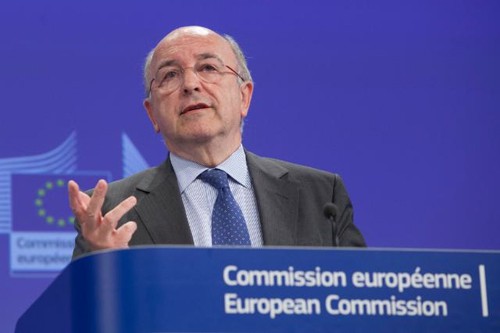
Antitrust authorities in the EU have levied a whopping €428m fine on Servier and several other companies for conspiring to delay generics of a widely-used heart drug.
France-based Servier will bear the brunt of the penalty – the largest ‘pay-for-delay’ fine levied in the EU to date – and will have to pay €330m for its role in preventing more affordable copies of blood pressure drug Coversyl/Aceon (perindopril) from reaching the market.
The generics companies implicated in the scandal – Niche/Unichem, Matrix (part of Mylan), Teva, Krka and Lupin – are facing penalties of €97m between them.
The fine is the latest in an ongoing clampdown on pay-for-delay deals by the European Commission, which has already seen sanctions imposed on Lundbeck and Johnson & Johnson and Novartis last year.
At a news conference yesterday EU competition commissioner Joaquin Almunia (pictured above) said perindopril earned Servier more than $1bn a year in 2005 and 2006, and was comfortably its biggest-selling product.
After the expiry of the basic patent on the perindopril molecule in 2003, Servier was facing imminent competition from generic firms who – through the use of new technology – were threatening to bypass its secondary patents on the drug.
Servier acquired rights to the technology in 2004, scuppering attempts by several generic firms to bring rival versions of perindopril to market, and between 2005 and 2007 embarked on a series of settlement transactions with companies trying to challenge the validity of its secondary patents.
Generic perindopril finally reached the market in 2007 after a key secondary patent was annulled in a UK court, and prices of the drug in the EU promptly dropped by up to 90 per cent, said Almunia.
“So for four years, patients and national health systems were deprived of the benefits of competition [and] earlier access to a cheaper version of perindopril,” he told reporters.
“Taxpayers across the EU largely financed Servier’s monopolistic rents, which were partially shared with its generic competitors.”
“The sanctions are proportionate to the infringement committed,” he added.
Seriver to appeal antitrust fine
Servier has said it will appeal the decision, arguing that it acted in a “transparent and legitimate” way to defend its patents and protect perindopril from generic competition.
The European Federation of Pharmaceutical Industries & Associations (EFPIA) also slammed the ruling, saying that patent settlement agreements in the pharmaceutical sector are “a symptom of the highly fragmented and inefficient intellectual property (IP) enforcement regime in Europe”.
Patent settlement agreements are legitimate where there are bona fide grounds for dispute, it argued, adding that the EC’s decision in this case “will perversely act to prolong patent litigation and undermine confidence in the patent system to the detriment of innovation and growth in Europe”.
Meanwhile, antitrust investigators in the EU are still looking at possible collusion between Teva and Cephalon, which is now owned by the Israeli company, concerning narcolepsy treatment Provigil (modafinil), while a case involving AstraZeneca (AZ) and Nycomed was dropped in 2012.




